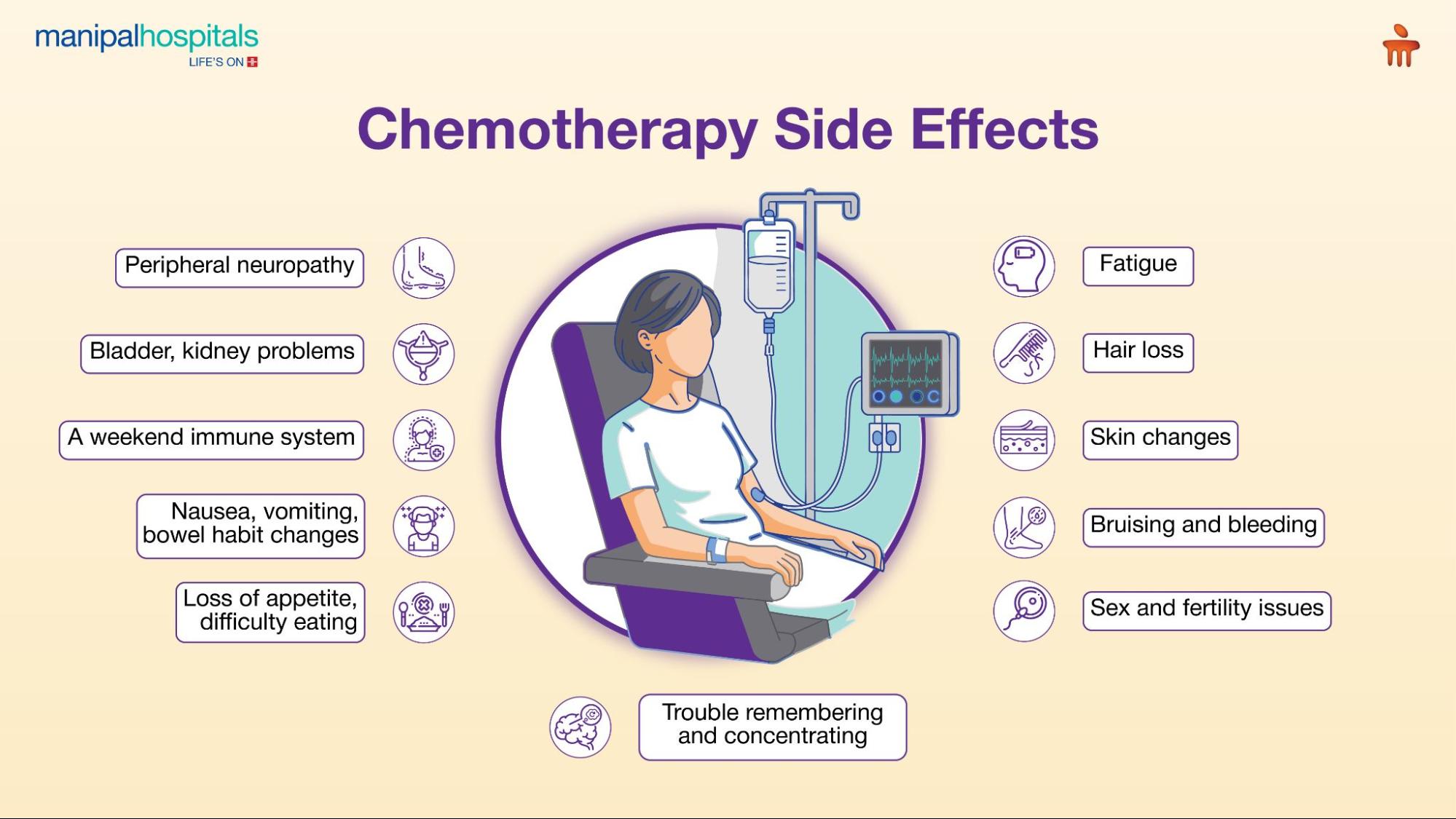Could something designed to save lives also bring unexpected challenges? Yes, it's possible!
Modern cancer treatment relies heavily on Chemotherapy, which is well-known for both its efficacy and adverse effects. The World Health Organisation has estimated that cancer incidence will increase globally by 77% between 2022 and 2050, requiring even more people to undergo Chemotherapy. So it is vital now more than ever to understand the toxic effects of this cancer treatment. Patients receiving Chemotherapy treatment for breast cancer and other cancers are often concerned about it.
This blog aims to demystify the Chemotherapy procedure, outline expectations, and offer guidance on how to manage its side effects effectively.
Synopsis
Understanding Chemotherapy: A Key Step in Cancer Treatment
What is Chemotherapy treatment?
Chemotherapy is a systemic oncologic treatment that uses cytotoxic drugs to destroy or inhibit the growth of rapidly dividing cells, including cancer cells. It plays a critical role in both curative and palliative care and is often used in combination with other treatment modalities such as radiotherapy, targeted therapy, and surgery.
Cancer treatment Chemotherapy involves the administration of powerful medications designed to target and stop the proliferation of cancer cells. The route of administration—oral, intravenous (IV), or injection—varies depending on the type and stage of cancer, as well as patient-specific factors.
Chemotherapy treatment for breast cancer is commonly used, either before or after surgery. This therapy is also used for the treatment of lung cancer and haematologic malignancies such as leukaemia and lymphoma. Each patient receives an individualised treatment plan, tailored according to the tumour’s location, cancer stage, and overall health condition.
What to expect before Chemotherapy? - Broadway’s Preparation Strategy
A well-planned preparation can be crucial before starting treatment to help mitigate some of the major Chemotherapy side effects that patients may experience.

The following steps are part of the planning process at Manipal Hospitals, Broadway:
-
The stage of cancer and a patient’s readiness for treatment are determined through imaging studies and blood tests
-
Oncologists describe the Chemotherapy plan and side effects to patients so they can better anticipate their treatment
-
Patients receive nutritional and mental health planning, enabling them to undergo treatment with optimal physical and emotional well-being
Following the planning process gives patients a sense of stability, boosts their confidence, and helps reduce treatment-related side effects.
What to expect during treatment? - Real-Time Support
During cancer treatment, Chemotherapy, patients receive drug cycles designed to target and destroy cancer cells throughout the body. While chemotherapy drugs are effective at stopping the growth of cancer cells, they can also damage healthy cells, leading to side effects. At Manipal Hospitals, Broadway, oncologists closely monitor these side effects during each treatment session to ensure patient safety and comfort.
The process includes:
-
Administration of Chemotherapy drugs, either orally or through IV therapy, following a prescribed schedule
-
Blood levels, vital signs, and organ function will be monitored routinely to assess treatment response and detect side effects early
-
Hydration therapy, anti-nausea medications, and dietary modifications can help in managing symptoms
-
Treatment also includes counselling, fatigue management, and nutritional support to improve overall well-being
What to expect after treatment? - Recovery and Monitoring
The body slowly heals from Chemotherapy, while the side effects may last for weeks or months. Patients commonly experience neuropathy, emotional changes, and fatigue, which all require ongoing care and support.
After the treatment, managing Chemotherapy side effects depends on lifestyle adjustments and regular follow-up appointments. These include:
-
Proper sleep, rest, and moderate physical activity can help restore energy levels
-
Frequent cognitive activities can reduce cognitive impairment due to cancer
-
Fluids and a healthy, balanced diet intake can bolster the immune system and restore bodily systems
-
Follow-up appointments identify late effects or recurrence
Medications, therapy, and support groups may help treat anxiety and mood fluctuation.
Read More Blogs: Tobacco Use and the Indian Youth: A Call for Urgent Action
Conclusion
Understanding Chemotherapy treatment is crucial for managing the process effectively and feeling more in control of its side effects. Chemotherapy involves the administration of strong drugs that also damage healthy cells, in addition to cancer cells, creating side effects that need careful monitoring. At Manipal Hospitals Broadway, Chemotherapy side effect management is proactive and tailored to each patient’s unique treatment and needs. The team provides professional counselling, medical support, and emotional care to help patients stay on track and maintain a good quality of life. Effective management of side effects plays a vital role in supporting a successful recovery.
FAQ's
Although it is not feasible to eliminate Chemotherapy side effects, they can be minimised with appropriate clinical management. Medical professionals will often prescribe treatment to manage pain, stimulate the immune system, or alleviate symptoms like nausea. Regular evaluations help detect issues early, allowing timely adjustments or modifications to the treatment plan.
-
Chemotherapy symptoms like nausea, vomiting, and exhaustion are mitigated gradually following treatment
-
Some symptoms, like nerve pain (neuropathy), can persist for weeks or months, while others, like hair loss or changes in appetite, usually last longer
-
Side effects can vary in duration and intensity for each individual due to factors such as age, overall health, type of medications used, and the intensity of the treatment
Chemotherapy can affect fertility, especially in younger patients. Before beginning Chemotherapy, the possibility of fertility preservation should be explored. Manipal Hospitals, Broadway, has reproductive specialists who can assist the patient with Cryopreservation and other fertility preservation methods.
Chemotherapy side effects can be managed through a combination of medications, lifestyle adjustments, and treatment of underlying medical conditions. Strategies such as adequate hydration, use of antiemetics, and light physical activity may help reduce fatigue, nausea, and other gastrointestinal symptoms. Physicians also tailor supportive care based on each patient’s response to treatment.
To schedule an appointment at Manipal Hospitals, Broadway, contact the Oncology Department directly, or visit the website.






















 4 Min Read
4 Min Read
















